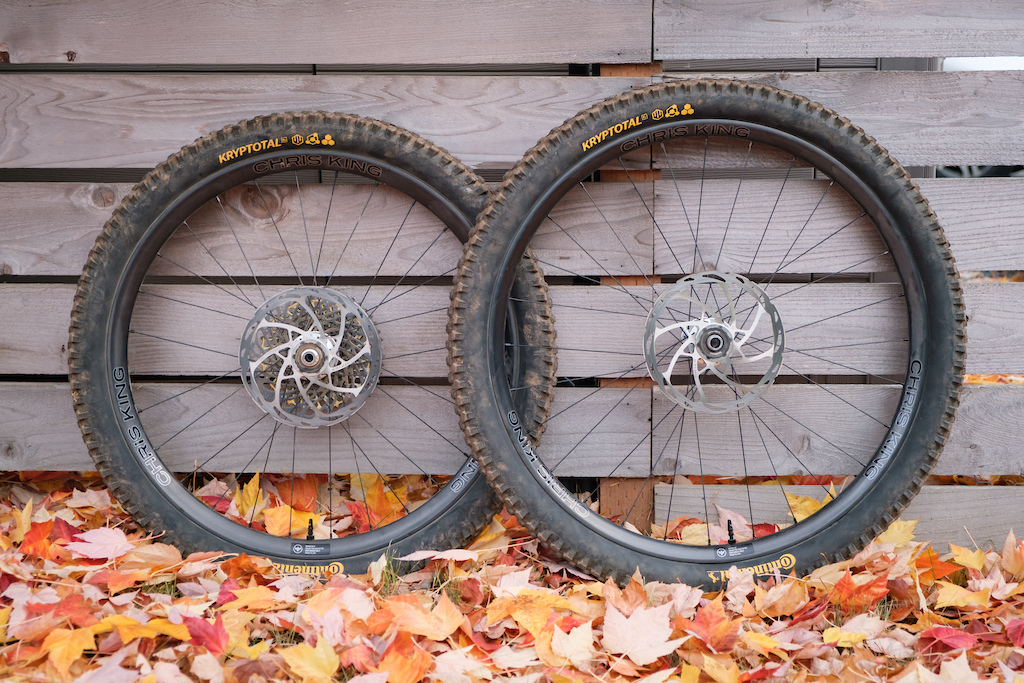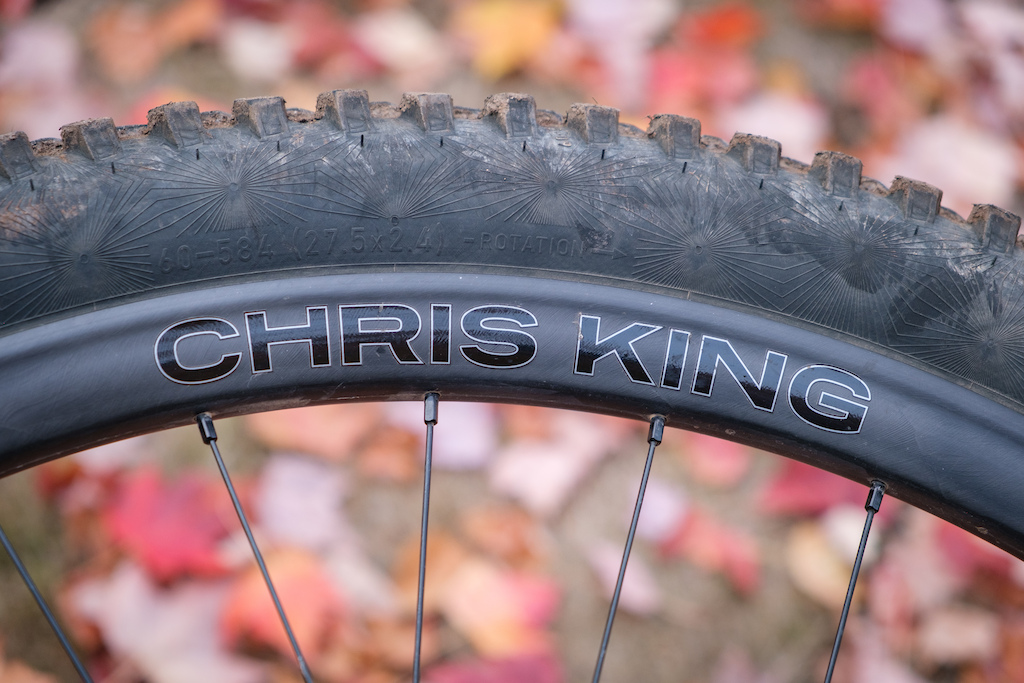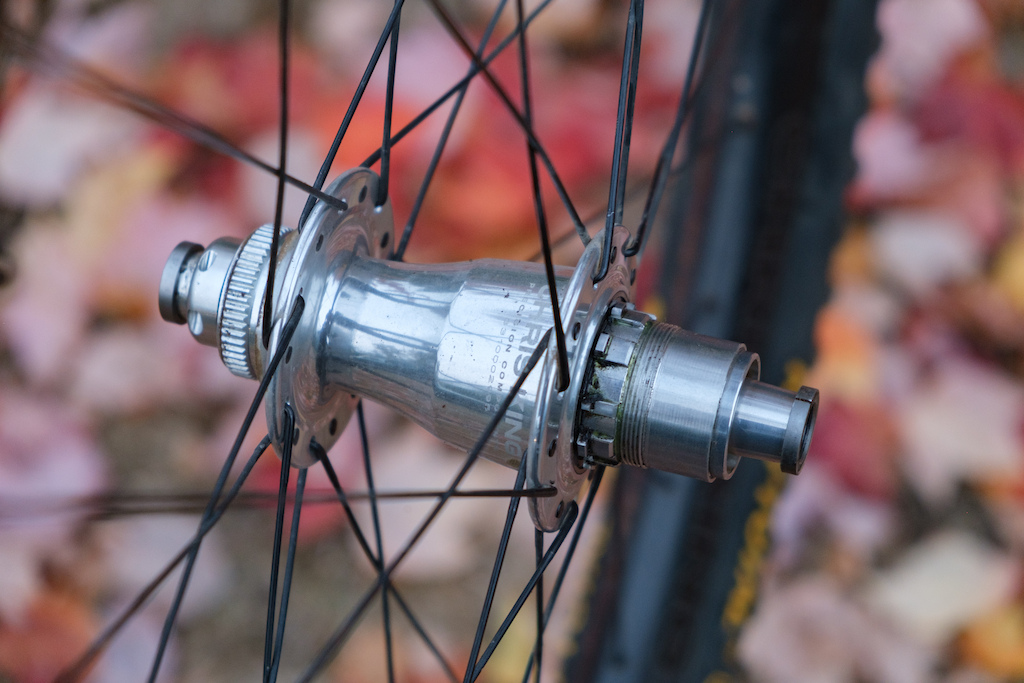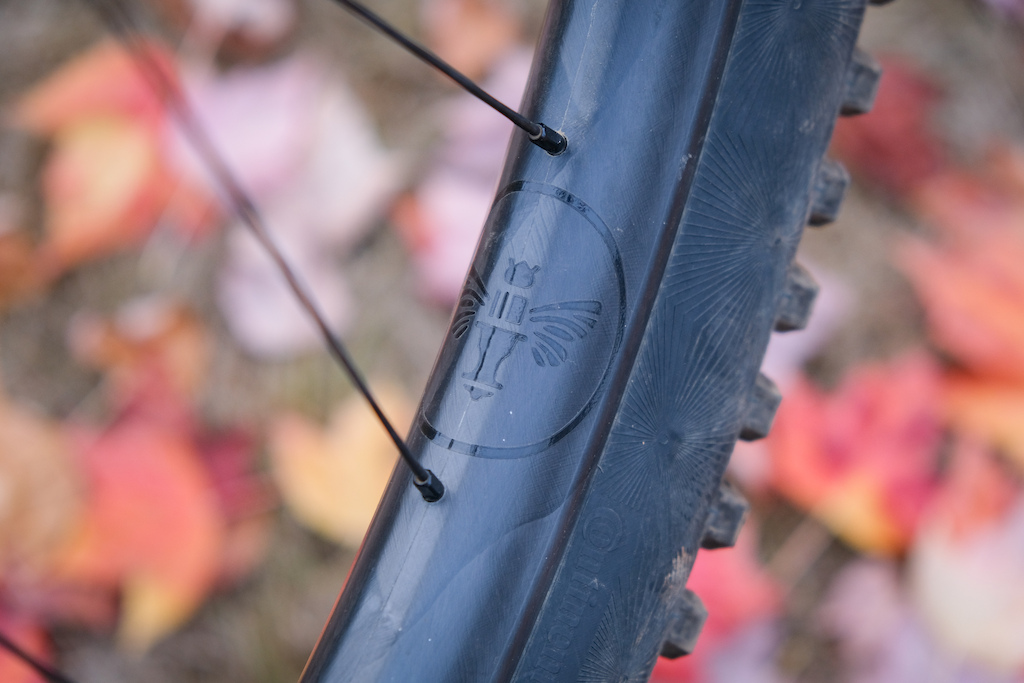Review: Chris King's US-Made MTN30 Carbon Wheels
Chris King's production facility in Portland, Oregon, has been cranking out mountain bike hubs for decades, but it was only this year that they introduced their first complete wheelset. The MTN30 wheels use US-made FusionFiber rims that are laced to Chris King's Boost Centerlock hubs.
If the name FusionFiber sounds familiar, that's because Revel and Evil also use the material for their own rims. It's still technically a carbon fiber rim, but a nylon polymer is used to hold everything together instead of epoxy. The process of laying up the rims is automated, and the final product doesn't need any sanding or deburring – there's no need for any finishing work or clearcoating. The rims are produced by CSS Composites in Utah, and the assembly of the wheels takes place at Chris King's facility in Oregon.
If the name FusionFiber sounds familiar, that's because Revel and Evil also use the material for their own rims. It's still technically a carbon fiber rim, but a nylon polymer is used to hold everything together instead of epoxy. The process of laying up the rims is automated, and the final product doesn't need any sanding or deburring – there's no need for any finishing work or clearcoating. The rims are produced by CSS Composites in Utah, and the assembly of the wheels takes place at Chris King's facility in Oregon.
MTN30 Wheel Details
• FusionFiber thermoplastic rims
• 28 Sapim D-Light spokes, 2 cross pattern
• Inner rim width: 29mm
• Made in USA
• Lifetime warranty
• Weight: 907 grams (27.5" rear) / 808 grams (29" front), 1715 grams total.
• Price:$2,550 USD
• More info: chrisking.com
• FusionFiber thermoplastic rims
• 28 Sapim D-Light spokes, 2 cross pattern
• Inner rim width: 29mm
• Made in USA
• Lifetime warranty
• Weight: 907 grams (27.5" rear) / 808 grams (29" front), 1715 grams total.
• Price:$2,550 USD
• More info: chrisking.com
The use of a nylon polymer instead of epoxy allows the rims to be recycled at the end of their life, although it's worth noting that they're not going to end up as rims again. Think tires levers, stems, or other items that can be compression molded from chopped up fiber. The MTN 30 rims do come with a lifetime warranty – in the event that one breaks, Chris King will send out a shipping label, rebuild the wheel with a fresh rim, and service the hub if necessary while they're at it.
The MTN 30 wheels are available in 29”, 27.5” or mixed wheel configurations, all with Boost spacing hubs and Centerlock rotor mounting. There's a wide range of hub color options, everything from silver to gold. Speaking of gold, the MTN 30 wheels aren't cheap – they're priced at $2,550 USD.
DESIGN
The MTN 30 rims have a 29mm inner width, and a depth of 23.5mm, numbers that fall right in line with what's become the norm for rims designed for all-round usage. Visually, there isn't anything that immediately sets the rims apart from a 'traditional' carbon rim – they're black, shiny, and the fibers can be seen when the light hits them the right way. Both wheels use 28 spokes laced in a two-cross pattern.
Chris King's machined aluminum hubs are renowned for their high quality and durability – they even make their own stainless steel bearings, which are claimed to burnish and become faster rolling with time. “Sorry, I'm going to be a little late – I need to ride more so my wheels spin even more smoothly” seems like a great excuse to get out for a longer ride than usual. A T10 torx is used to adjust the preload ring on each hub that pushes against the angular contact bearings. It's something that typically needs to be done once or twice as the hubs settle in, and then it rarely needs adjustment, at least in my experience.
At the heart of the rear hub is the RingDrive, which delivers 72 points of simultaneous engagement. That equates to a fairly quick 5-degrees between points of engagement. There are faster engaging hubs out there – I9's Hydra hub checks in at a near-instant .52-degrees between engagement points – but 5-degrees is still plenty quick, and I never found myself wishing for anything less out on the trail.
A basic hub service is a fairly simple procedure, and Chris King has easy-to-find videos and documentation on their website. A special tool is required to fully disassemble the hubs, but that's not something that should be necessary more than once every year or two.
Chris King's Ring Drive has 72-points of simultaneous engagement.
SETUP
Getting the MTN 30 wheels set up was a straighforward procedure, which is pretty much a given these days – wider rim profiles, and the tubeless tires designed for them typically make it simple to get a tire seated and sealed without any swearing. I will say that I've gotten spoiled by Reserve's Fillmore valves this season. Yes, they're expensive, but the speed that they fill a tire and the lack of clogging has made me wish that all wheels came with them. The valves on the MTN30 wheelset are nice, and the top cap even has a little flying hub etched into it, but they don't work as well as the Reserves.
My one gripe when it comes to setting up these wheels has to do with the fact that Chris King only produces Centerlock compatible mountain hubs – the 6-bolt option is no longer in their catalog. I get it, Centerlock is probably lighter and it is easier to install, but I have a stack of 6 bolt rotors, and a non-existent stack of Centerlock rotors. That means I had to use an adaptor in order to use a 6 bolt rotor, which takes away the convenience of the design.
I used Continental's Kryptotal DH tires for the majority of the test period, without inserts, and with pressures set to 21 psi for the front and 23 psi for the rear. The wheels started off the test period on a Santa Cruz Nomad V6, and most recently were installed on a Trek Fuel EX.
PERFORMANCE
It's getting harder and harder to tell carbon wheels apart, at least when it comes to ride feel. That's a good thing, since it means you're less likely to end up with a set of wheels that seem like they're trying to rattle your fillings out whenever the trail gets rough. The days of brutally stiff wheels seem to be mostly behind us as rim profiles and carbon layup have evolved.
The MTN30 wheels fall squarely into the 'comfortable' category, and even when pinballing down some of the jankier trails on Vancouver's North Shore I never felt any harshness. Now, could I notice the supposed 50% increase in damping compared to 'traditional' carbon fiber rims? I wouldn't go that far – the MTN30 wheels traded places with a Reserve 30|HD wheelset and there wasn't a dramatic difference in ride quality. If pressed, I'd say that the MTN30 wheels felt a little more muted at higher speeds in chunkier sections of trail, but again, we're not talking about a night and day difference here. When it comes to tangible differences in compliance, SRAM's ZeroMoto wheels are one of the only options I've tried where the extra flex is immediately noticeable.
As far as stiffness when cornering goes, the wheels offered plenty of support, and no matter how much I squared off a turn the spokes never made any noises to express their displeasure.
The hub engagement was quick and extremely solid, and the trademark 'angry bees' noise when freewheeling was actually less pronounced than I'd expected. Using a different freehub oil could probably change that, but I'm personally a big fan of hubs that don't make much noise, so the fact that these hubs weren't overly loud is a plus in my book.
WEIGHT
The MTN30 wheels are slightly lighter than their counterparts in this category - the 29" set weighs 1746 grams. For comparison, Roval's Traverse wheels and We Are Ones Union wheels weigh 1840 grams, Evil's Loophole wheels weigh 1940 grams, and Santa Cruz's Reserve 30|HD wheels weigh 1880 grams. 100 grams isn't that much in the grand scheme of things, but it all adds up, and for gram conscious riders it's worth noting that the MTN 30's aren't overly heavy.
DURABILITY
Other than a quick adjustment of the hub preload and one brief trip to the truing stand for the rear wheel, the MTN 30 wheels haven't needed any maintenance, and those are adjustments that are typical for a set of new wheels. I've smacked a decent number of rocks and roots that were hiding in piles of moon dust, and so far they've taken all those hits in stride. The bearings are still spinning incredibly smoothly – there's zero grittiness or resistance. They just keep going and going when the wheel is spun.
Trail conditions were extra-dry and dusty for the majority of the test period – I'll put in some additional miles now that the rains have returned and update this review if any issues arise.
Pros
+ On the lighter side for this category
+ Excellent hubs
+ Pleasantly neutral ride quality
Cons
- Expensive
- Centerlock rotor mounting only
Pinkbike's Take
Author Info:
Must Read This Week









But I’d bet low single digit percentages of these are ever actually recycled. Yes maximizing service life is the most eco-friendly option.
Don't even get my started on tires. I hate how many get discarded. I have a stack I don't want to use for trail riding anymore that I try to give away when I can to people for in-town riding. But still they all end in the landfill. err.
Everything coming from CSS - Be it from Revel, Evil, King, Atomik, or anyone else using FusionFiber, is recyclable. And getting that rim back for recycling is part of the warranty process as I understand it.
I sat down in person with a team from CSS last month. I can tell you they very much want broken rims back so they can use the materials for other products. It's good for the environment, but also it's cheaper for them to use these materials instead of buying virgin materials at full cost again, so it's a win win from the perspective of a socially and environmentally responsible business. No chances about it, they are for sure being recycled/down-cycled.
I ended up going with Santa Cruz Reserve specifically because they ship me a complete wheel rather than have to go through the rebuild process.
They also will just ship you a rim, but then the wheel build is your responsibility.
My humble opinion is that no hub holds a candle when it comes to quality and finish when compared to Kings. Every part of the hub is precision quality and jewelry finished. Just take apart some Kings and some I9's and theres some subtle differences - which I get arent a big deal to everyone.
However- if I was in my 20's I'd go I9 ones (or honestly DT350's) with ex471's and it makes no difference in race results except you get to $1000 more races.
Regardless of how good CK hubs may be, they are definitely not $700/wheel better.
What's bonkers to me is when people were buying, homes at 14% or even 18% interest. Granted, relative to adjusted wages, those home were much much cheaper. If this possibly shady website is to be believed, we're at a roughly historically average interest rate right now. themortgagereports.com/61853/30-year-mortgage-rates-chart
Where things get really complicated is how interest rates affect the sales price of the home. As I understand it, lower rates lead to cheaper mortgages which lead to bidding wars and higher prices (great for sellers, bad for buyers). Higher rates make the mortgages more expensive, so prices cool down (bad for sellers, a wash for buyers).
I personally don't care if they are made in the US, Taiwan, or Asgard. A good product at a fair price is what I put my $$$ towards.
The discussion should be about supporting safe working environments and decent wages. Unfortunately there's to many spoiled/entitled people to fill manufacturing and raw material production jobs that we need to bring down cost here. Not to mention when we "cleaned up the environment" when we moved these massively polluting industries overseas so a bunch of politicians could pat there selves on the back for doing a "good job at reducing pollution with regulation/laws" all the while the put the garbage in someone else's closet and dismembered our position in global manufacturing. About another 20-30yrs and we're going to be the cheap labor force of the world if they keep running this ship into the ground, which it seems like there trying to do...sorry had to get that off my chest, not directed at you just screaming at the Cloud like an old man.
Centre lock requires a lock ring tool, a longer torque arm (and it might as well be a torque wrench as CL has a reputation for loosening off if it isn't torqued up perfectly) and good luck finding a CL rotor in your favourite flavour in Madeira or some other destination (in fact good luck finding a CL rotor in Whistler in the middle of the bike season - 13 shops and no CL rotors).
So you are back to using an adapter which is a. ugly, and b. has the same torque issues as the CL lock ring.
CK has grand ideas of being more sustainable and using less with the move to CL only but just like T47 was made available to the bike world and it is a better BB standard over all if the industry isn't on board it will be CK and XC racers using CL rotors and everyone else is going to stick with 6 bolt.
In my decades in a bike shop, I've seen far more loose six-bolt rotors than Centerlock. As a matter of fact, I've never seen a loose centerlock, but on my own bikes I've had the six-bolt rotors come loose more than once. Of course a nice dose of loctite fixes this, but even at torque and with the factory applied loctite, they do occasionally come loose.
Still prefer 6 bolt for no good reason though. and that is what I have on my trail bike.
It is simple…some folk like CL and some folk like 6B.
1985 Civic - $800
1985 Civic Hatchback - $700
1987 Accord - $1000
1992 Saturn - $1000
1992 Mercedes 300E - $2000 (one of my favorite cars ever)
1996 Volvo 850 wagon - $2000
1994 Nissan Pickup - $1500
1992 Ford Escort - $2000
2002 Ford Focus Wagon - $3000
"Automated cutting means we have no wasted material, and recycling FusionFiber is as simple as shredding it into short fibers. These fibers can be directly repurposed into new compression-molded parts for other commercial applications with zero waste."
i.e. "these fibers CAN be directly repurposed"... but are they?
I know, I'm a suspicious/cynical SOB
CL only is not good, but the real bummer is no more needle bearing between the ring driver and axle. The indestructible nature is gone, just google "clunking in rear Chris King hub" or "play in rear Chris King hub", or look on MTBR. Myriad of issues and warranty claims with the current generation mtn hubs.
The current hubs are a sad comparison to what they once were. There are now many options that are just as good, if not better, and many times less expensive.
Chris King is now for the dentists who want pretty colors so everyone looks at their bike while they drive it around town on their Tesla.
I've had two sets of Chris King hubs, and whilst beautifully engineered, they were heavy, required ££tools to service, the preload annoyingly came loose, and they're no more reliable than DT Swiss. Oh, and the DT Swiss are way cheaper too.
Hopefully you can buy the rims on their own, as they must be light if the wheels as a whole are lightweight despite heavier hubs
Adapters aren’t guaranteed to stay in place, even with locktite.
Will that 39mm rim fit my Maxxis WT tire better than my 23mm rim?
But yeah, if you’re still running 11 speed shimano, the lack of a stainless option would be a bummer.
What is the noisiest hub you can get I wonder?
Completely agree.
DT Swiss are on most of my bikes, and now Shimano Scylence too. Love the silent freewheel and instant pickup!
There are valid reasons aside from being an "internet parrot." I certainly don't hate CL, but would take ISO6 over CL any day of the week if the option was given.